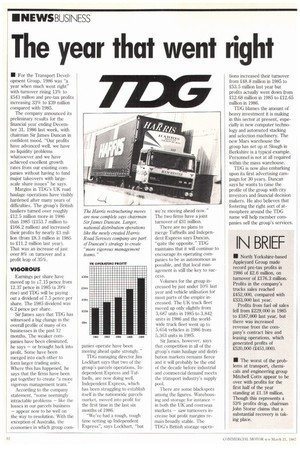The year that went right
Page 14

If you've noticed an error in this article please click here to report it so we can fix it.
• For the Transport Development Group, 1986 was "a year when much went right" with turnover rising 13% to 2543 million and pre-tax profits increasing 33% to 239 million compared with 1985.
The company announced its preliminary results for the financial year ending December 31, 1986 last week, with chairman Sir James Duncan in confident mood, "Our profits have advanced well, we have no liquidity problems whatsoever and we have achieved excellent growth rates from our existing companies without having to fund major takeovers with largescale share issues" he says.
Margins in TDG's UK road haulage operations have visibly hardened after many years of difficulties. The group's British hauliers turned over roughly £12.5 million more in 1986 than 1985 (2153.7 million to 2166.2 million) and increased their profits by nearly 23 million (from 28.3 million in 1985 to 21L2 million last year). That was an increase of just over 8% on turnover and a profit leap of 35%.
VIGOROUS Earnings per share have moved up to 17.15 pence from 12.37 pence in 1985 (a 39% rise) and TDG will be paying out a dividend of 7.5 pence per share. The 1985 dividend was 6.2 pence per share.
Sir James says that TDG has witnessed a big change in the overall profile of many of its businesses in the past 12 months. The weaker companies have been eliminated, he says — or brought back into profit. Some have been merged into each other to form larger trading units. Where this has happened, he says that the firms have been put together to create "a more vigorous management team."
According to the company statement, "some seemingly intractable problems — like the losses in our parcels business — appear now to be well on the way to resolution. With the exception of Australia, the economies in which group corn panics operate have been moving ahead quite strongly."
TDG managing director Jim Lockhart says that two of the group's parcels operations, Independent Express and Tuffnells, are now doing well. Independent Express, which has been struggling to establish itself in the nationwide parcels market, moved into profit for the first time in the last six months of 1986.
"We've had a rough, tough time setting up Independent Express", says Lockhart, "but we're moving ahead now." The two firms have a joint turnover of 231 million.
There are no plans to merge Tuffnells and Independent Express says Duncan, "quite the opposite." TDG maintains that it will continue to encourage its operating companies to be as autonomous as possible, and that local management is still the key to success.
Volumes for the group increased by just under 10% last year and vehicle utilisation for most parts of the empire increased. The UK truck fleet moved up only slightly from 3, 687.units in 1985 to 3,842 units in 1986 and the worldwide truck fleet went up to 5,654 vehicles in 1986 from 5,363 units in 1985.
Sir Jame, however, says that competition in all of the group's main haulage and distribution markets remains fierce and it will probably he the end of the decade before industrial and commercial demand meets the transport industry's supply pool.
There are some blackspots among the figures. Warehousing and storage for instance — in both the UK and overseas markets — saw turnovers increase but profit margins remain broadly stable. The IDG's British storage opera
tions increased their turnover from 248.8 million in 1985 to 253.5 million last year but profits actually went down from 212.68 million in 1985 to 212.65 million in 1986.
TDG blames the amount of heavy investment it is making in this sector at present, especially in new computer technology and automated stacking and selection machinery. The new Mars warehouse the group has set up at Slough in Berkshire is a typical example. Personnel is not at all required within the mass warehouse.
TDG is now also embarking upon its first advertising campaign for 30 years. Duncan says he wants to raise the profile of the group with city investors and financial decision makers. He also believes that fostering the right sort of atmosphere around the TDG name will help member companies sell the group's services.




















































































